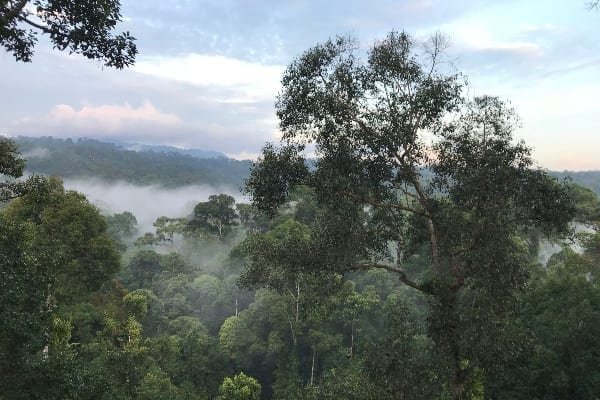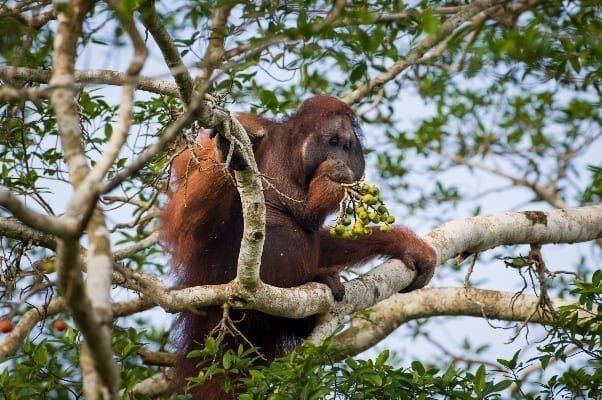This article first appeared in our Restoration Revolution issue of MyGreenPod Magazine, distributed with The Guardian on 06 Sept 2019. Click here to subscribe to our digital edition and get each issue delivered straight to your inbox
Main image: Nina Seale, WLT
Let us start with three vignettes: the first, in a pub in Suffolk; the second, in a boat on Borneo’s Kinabatangan River and the third, on a ruined rice paddy in Kerala, India.
It was a little more than 20 years ago. My new neighbour, Pete Wilkinson, had been a Greenpeace man in the Antarctic, so he had some conservation street cred all right. He introduced me to another neighbour, John Burton, in our local pub. We had the what-do-you-do? conversation.
John told me he bought land. Land with rainforest on it, for example. It’s all very well trying to save tigers and elephants and orangutans, but if you don’t save the land they live on, you might as well not bother. And once you’ve got it, and it’s yours, no one can do anything bad to it, can they? Save the land and you save the life on it. The simplicity of genius. I was so impressed I bought him a pint.
What would you do with £1m?
Some years later, I was travelling down the Kinabatangan River with Isabelle Lackman, CEO of the Malaysian NGO Hutan. I could, I suppose, tell you how fabulous the place is, but I’d need as many words as there are species in the rainforest.
Isabelle, what would you do if you had a million pounds? She laughed. And then she showed us an area of riverside forest, an area that joined up the land already owned by Hutan and which is managed by and for the local community. It was a stunning area: perfect forest. All that was needed to safeguard it for ever was a million quid.
A year later, the land was ours. I mean, the land was hers. I mean, the land was in the hands of the local community. I mean, I think, that the forest had been restored to itself: safe, out of danger, able to continue with its essential job of sheltering hornbills, providing income for the people of Kampung Sukau, soaking up carbon and transpiring oxygen into the Earth’s heated and depleted atmosphere.
A year or two earlier, I was walking across a stretch of cultivated land that lay between two areas of forest in Kerala. John and I were both there, flanking Vivek Menon, CEO of the Wildlife Trust of India.
‘Look at this land!’ Vivek was saying. It bore unmistakable signs of elephants: huge loaves of their dung, what remained of the crops trashed, the human dwellings already falling down.
‘Look at this land! It is ruined! And I – am – so – happy!’ This land was a historical elephant route, and the people who lived there suffered as a result. Now the village had agreed to move, voluntarily, to a place away from elephants, where they could grow spices and move into beautiful new accommodation – and the land could return to what it always was: a corridor for elephants, making the two once-separated chunks one forest again. And if an elephant can go through a corridor, so can everything else.
WHAT YOU CAN DO
A row about Brexit. A row about Donald Trump. A row between politicians about who’s boss. And all the time, the most urgent topic of them all – the planet’s decreasing ability to sustain life – hardly gets a look in.
And in this depressing landscape, it is natural to wonder: is there anything at all I can do about it? Or do I have to leave it all to those politicians? Is there anything I can do other than not buying plastic water bottles? Yes there is.
A contribution to the World Land Trust brings about that rare double win: money that makes you feel better about the world and yourself, and money that will actually do some serious practical good.
If it’s good enough for David Attenborough then it’s good enough for me.
 Play Video about This Rock Might Just Save The World
Play Video about This Rock Might Just Save The World Play Video about Play 2 hours of rock
Play Video about Play 2 hours of rock Play Video about Play 2 hours of brook
Play Video about Play 2 hours of brook Play Video about Play 2 hours of sheep
Play Video about Play 2 hours of sheep












































